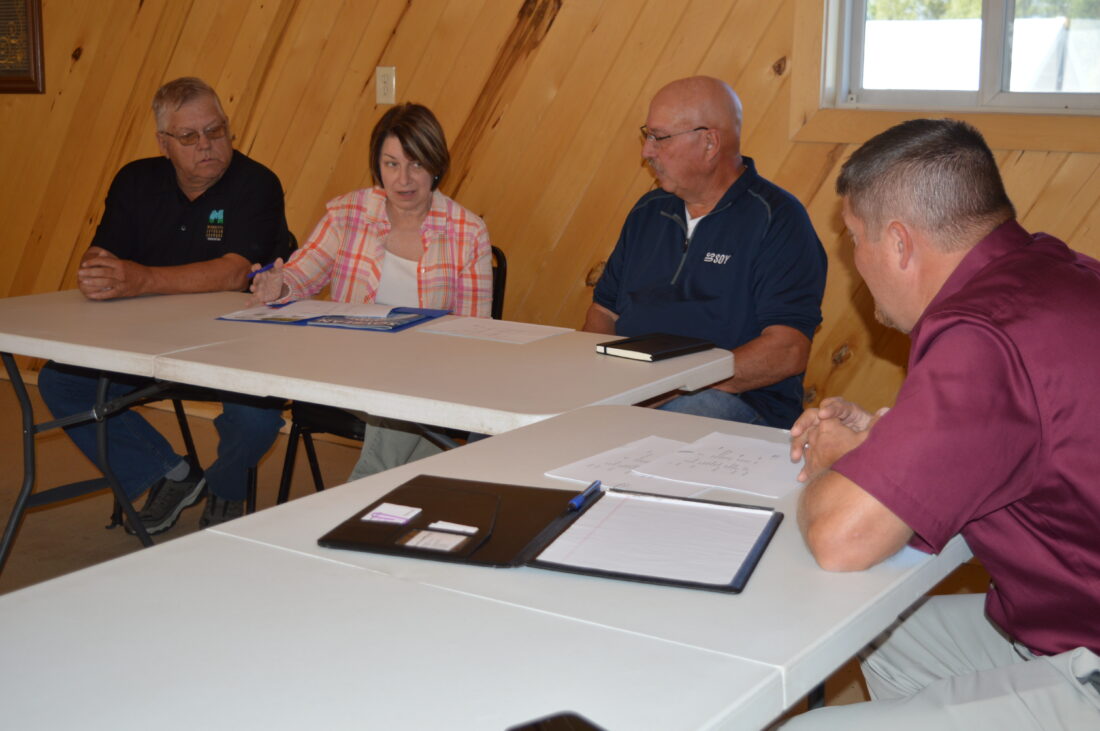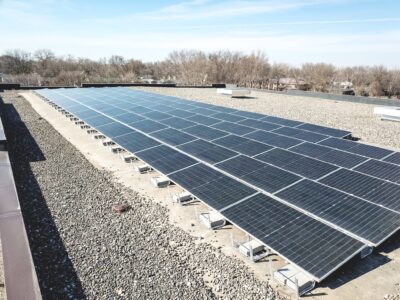Klobuchar talks trade war concerns with area farmers
Farms dealing with “perfect storm” of tariffs and other issues, residents say

Sen. Amy Klobuchar spoke with Lincoln County farmers including Bob Worth and Joel Schreurs, during a visit to a rural Tyler farm Monday.
TYLER — The trade war with China is a growing concern for Minnesota agriculture, a group of southwest Minnesota residents said Monday.
Joel Schreurs, a Tyler area farmer and Minnesota Soybean Research and Promotion Council member, said the issue of tariffs was one thing he wanted to talk about with U.S. Sen. Amy Klobuchar as she visited his farm Monday.
“If it drags out, this trade war, farmers are going to have to be compensated,” said Schreurs. Schreurs said he didn’t want subsidies. But if farmers were facing major financial losses, “Something has to give,” he said.
“It’s all mushrooming. It’s getting quite serious,” said Lake Benton area farmer Bob Worth.
Worth and Schreurs were part of a group of southwest Minnesota residents and agriculture spokespeople who met with Klobuchar.
Matt Schreurs, with First Farmers and Merchants Bank, said several factors have combined into “kind of a perfect storm of ugly” for soybean farmers. Schreurs said tariffs have made it harder for farmers to sell soybeans, and input costs are high.
“There’s a lot of focus on this nationally. To me, it’s just the beginning of people waking up and noticing it,” Klobuchar told area residents. Bankruptcies for small farms were increasing, she said.
Matt Schreurs told Klobuchar that, based on current 2026 grain prices for corn and soybeans, and estimated 2026 input costs, farmers could lose money per acre next year.
“You’ve got a lot of farmers right now that just can’t cash flow to pay the day to day bills,” he said.
Joel Schreurs and Worth said younger farmers could be hit especially hard.
“We’re going to lose them,” Worth said.
Joe Smentek, executive director of the Minnesota Soybean Growers Association, also presented Klobuchar with information from an American Soybean Association report.
China is a major buyer of U.S. soybeans, but the ASA said the volume of soybeans shipped to China in recent years was still not at the same level it was before the last trade war in 2018.
The ASA report said American soybean farmers are now facing global competition from Brazilian soybeans. In 2023 and 2024, China purchased 25 million metric tons of soybeans from the U.S., the ASA said. But a 20% retaliatory tariff on U.S. soybeans makes American farmers uncompetitive against South America. The ASA said the absence of a trade deal has weakened soybean prices, and without action to remove tariffs, farmers risked further price drops, the ASA said.
Area farmers said tariffs also hurt them by increasing the cost of needed supplies like fertilizer.
Tariffs are complicating exports between the U.S. and other countries compared to the 2018 trade war, Smentek said. Before, he said, “You had countries like Bangladesh that were able to come in and there were no tariffs, and they were able to take advantage of the cheap soybeans and buy some of this crop.”
“This time, there’s tariffs 10% across the board, and with some (countries) they make it even worse,” Smentek said. “So we’re not seeing those other buyers come in.”
In the past, the U.S. Agency for International Development (USAID) also bought soybeans, Smentek said. Cuts to USAID could make the impact of the current trade war worse for farmers. “It’s another avenue, and another relief valve that’s not there right now.”
In talking with area farmers, Klobuchar said possible ways to help soybean farmers included addressing the tariff issue and the USAID freeze, as well as finding new markets for biodiesel fuels.
After speaking with Lincoln County farmers, Klobuchar said legislators needed to look at the major factors threatening soybean farmers.
“There’s got to be some resolution” to tariff issue, Klobuchar said.
“I don’t like the tariffs, and I don’t like what they’ve done with the USDA, but now we’ve still got to try to figure our way out,” Klobuchar told area farmers.





